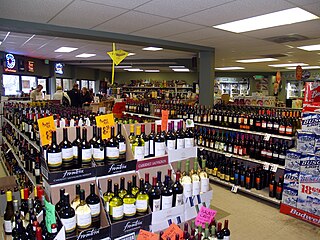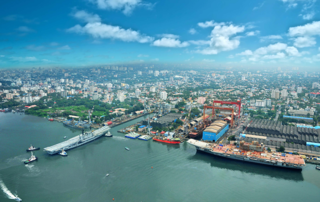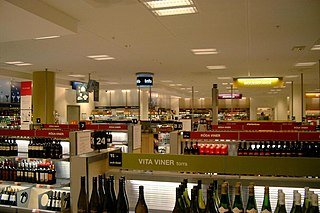
The Liquor Control Board of Ontario (LCBO) is a Crown agency that retails and distributes alcoholic beverages throughout the Canadian province of Ontario. It is accountable to the Legislative Assembly through the minister of finance. It was established in 1927 by the government of Premier George Howard Ferguson to sell liquor, wine, and beer. Such sales were banned outright in 1916 as part of prohibition in Canada. The creation of the LCBO marked an easing of the province's temperance regime. By September 2017, the LCBO was operating 651 liquor stores.

Mohan Meakin is a large group of companies which started with Asia's first brewery incorporated in 1855 by Edward Dyer at Kasauli in the Himalayan Mountains in India under the name Dyer Breweries.

A liquor store is a retail business that predominantly sells prepackaged alcoholic beverages, including liquors, wine or beer, usually intended to be consumed off the store's premises. Depending on region and local idiom, they may also be called an off-licence, off-sale, bottle shop, bottle store or, colloquially, bottle-o, liquor store or other similar terms. A very limited number of jurisdictions have an alcohol monopoly. In US states that are alcoholic beverage control (ABC) states, the term ABC store may be used.

Alcoholic beverage control states, generally called control states, less often ABC states, are 17 states in the United States that have state monopolies over the wholesaling or retailing of some or all categories of alcoholic beverages, such as beer, wine, and distilled spirits.

The economy of Kerala is the 11th largest in India, with an annual gross state product (GSP) of ₹13.11 lakh crore in 2024–2025. Per-capita GSP of Kerala during the same period is ₹372,783 (US$4,400), the sixth largest in India. In 2019–20, the tertiary sector contributed around 63% of the state's GSVA, compared to 28% by secondary sector, and 8% by primary sector.

Alcohol Beverage Services, previously known as the Department of Liquor Control is a government agency within the County of Montgomery, Maryland, and is the wholesaler of beer, wine and spirits alcoholic beverage throughout the county's 507-square-mile (1,310 km2) area. Montgomery County Department of Liquor Control also exercises control over retail sales for off-premises consumption, either through government-operated package stores or designated agents.

A liquor license is a governmentally issued permit for businesses to sell, manufacture, store, or otherwise use alcoholic beverages.

An alcohol monopoly is a government monopoly on manufacturing and/or retailing of some or all alcoholic beverages, such as beer, wine and spirits. It can be used as an alternative for total prohibition of alcohol. They exist in all Nordic countries except Denmark proper, and in all provinces and territories in Canada except Alberta. In the United States, there are some alcoholic beverage control states, where alcohol wholesale is controlled by a state government operation and retail sales are offered by either state or private retailers.
Indian-made foreign liquor (IMFL) is the official term used by governments, businesses and media in India to refer to all types of liquor manufactured in the country other than indigenous alcoholic beverages such as feni, toddy, arrack and others.

Drinks containing alcohol are typically divided into three classes—beers, wines, and spirits—with alcohol content typically between 3% and 50%. Drinks with less than 0.5% are sometimes considered non-alcoholic.

Alcohol laws are laws relating to manufacture, use, as being under the influence of and sale of alcohol or alcoholic beverages. Common alcoholic beverages include beer, wine, (hard) cider, and distilled spirits. Definition of alcoholic beverage varies internationally, e.g., the United States defines an alcoholic beverage as "any beverage in liquid form which contains not less than one-half of one percent of alcohol by volume". Alcohol laws can restrict those who can produce alcohol, those who can buy it, when one can buy it, labelling and advertising, the types of alcoholic beverage that can be sold, where one can consume it, what activities are prohibited while intoxicated, and where one can buy it. In some cases, laws have even prohibited the use and sale of alcohol entirely.

Sale and consumption of alcoholic liquor for human consumption is prohibited in the states of Bihar, Gujarat, Mizoram, and Nagaland. All other Indian states and union territories permit the sale and consumption of alcohol.
The Tamil Nadu State Marketing Corporation (TASMAC) is a company owned by the Government of Tamil Nadu, which has a monopoly over wholesale and retail vending of alcoholic beverages in the Indian state of Tamil Nadu. It controls the Indian Made Foreign Liquor (IMFL) trade in the state.
The legal drinking age in India and the laws which regulate the sale and consumption of alcohol vary significantly from state to state. In India, consumption of alcohol is prohibited in the states of Bihar, Gujarat, Nagaland, and Mizoram, as well as the union territory of Lakshadweep. There is partial ban on alcohol in some districts of Manipur. All other Indian states permit alcohol consumption but fix a legal drinking age, which ranges at different ages per region. In some states the legal drinking age can be different for different types of alcoholic beverage.

The Kerala State Excise is the law enforcement agency for excise in state of Kerala, India. Kerala Excise has its headquarters in Thiruvananthapuram, the state capital, and is headed by the Excise Commissioner, with the rank of Additional Director General of Police. The department administers laws related to liquor, narcotic drugs and psychotropic substances, medicinal preparations containing alcohol and narcotics. The current commissioner of Excise is Shri Mahipal Yadav, IPS. The Excise Commissioner reports to the Excise Minister of Kerala, who serves as the chief executive of the department. The Kerala Excise Academy and Research Centre, Thrissur trains the excise officers and that runs full-term basic courses for Excise Inspectors, Excise Preventive Officers, Civil Excise Officers, Women Civil Excise Officers and Excise Drivers. Established under the provisions of the Kerala Abkari Act, 1077, the department plays a crucial role in regulating and controlling the production, distribution, and consumption of alcoholic beverages and other intoxicating substances and the enforcement of the NDPS Act within the state of Kerala.
Telangana State Beverages Corporation Ltd (TSBCL) is a public sector company owned by the government of Telangana, which has a monopoly over wholesale and retail vending of alcohol in Telangana. It controls the retail sale of Indian Made Foreign Liquor (IMFL) and beer trade in the state.
Pincon Spirit Limited (PSL), formerly Sarang Viniyog Ltd., incorporated in 1978, is an Indian company that manufactures industrial alcohol, Indian-made foreign liquor (IMFL), country liquor and desi darus. Monoranjan Roy serves as the chairman and managing director of the company. It is listed with the Bombay Stock Exchange (BSE), the National Stock Exchange (NSE) and the Securities and Exchange Board of India.

Bangla is an alcoholic beverage made from starch and sold in West Bengal. There are government licensed counters that sell this beverage. Bangla is a distilled country liquor. Notable Bengali liquor brand names are Uran, Captain, Pincon Bangla number one, Sengupta's Punch, Sengupta's Spark, Tarzan, Dada, Wonder, etc.















